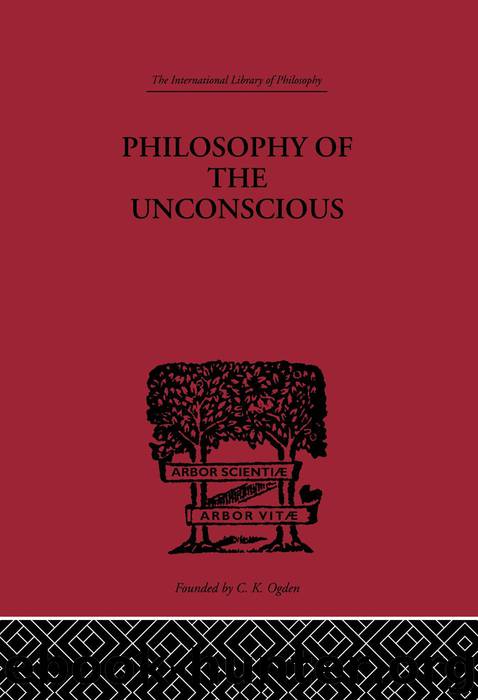Philosophy of the Unconscious by Eduard Von Hartmann

Author:Eduard Von Hartmann [Hartmann, Eduard Von]
Language: eng
Format: epub
ISBN: 9780415225564
Publisher: Taylor and Francis
Published: 2014-06-23T00:00:00+00:00
VI.
THE CONCEPTION OF INDIVIDUALITY.
INDIVIDUAL means indivisible (as does atom); but every one knows that individuals may be cut into pieces and divided. We can thus only think of something as individual which in its nature cannot be divided if it is to remain what it is; but this is the notion of unity—Greek monas (not to be confused with the numerical concept of the one, Greek ). According to this, the conceptions unity or monad and individual coincide; but one very soon sees that unity is a wider notion than individual, i.e., every individual is a unity, but not every unity is an individual. Thus every connected form, in virtue of the continuity of space, is a unity. I cannot divide it without annihilating it; still I shall not call the accidental unity of form of a clod, e.g., an individual. Further, every movement or every occurrence possesses a unity in virtue of the continuity of time, e.g., a tone; this unity likewise is not an individual (comp. V. Kirchmann, “Philosophie des Wissens,” vol. i. pp. 131–141, 285–307). The unity of coinherence or of interpenetration, as it appears, e.g., in colours, mixtures of taste or smell, and in different qualities of the same thing, is reducible partly to existence in the same place, partly to the temporal coexistence of different qualities, partly to the causal unity of succession, and can accordingly not be regarded as a particular species of unity. The unity of the causal relation is the strongest that there is. We have to distinguish in it three kinds: (1) Unity by identity of the cause (as in the different perceptions of a thing); (2) unity by reason of identity of the purpose (as in the many contrivances of the eye for seeing); (3) unity by mutual action of the parts, so that the function of each part is cause of the persistence of the other.—These unities also do not suffice for the conception of individuality. An example of the first is the unity of the many perceptions of a thing, so far as they do not directly contain the identity of place and time, but are only referred to the thing as identical causes. Nobody will maintain that the unity of the perception of a thing is an individual. In the second place, if the unity of purpose consists in the construction of a building, we should not call the sum of the workmen which have this purpose an individual. Thirdly, if a country lives on the natural products of its colonies, and the colonies only exist by reason of the importation of the artificial productions of the mother country, there is here a perfect reciprocity, and yet nobody will call the sum of colonies and mother country an individual.
Each of these unities, then, shows itself as insufficient to fix the notion of the individual. Just as insufficient are the external characteristics which are set up here and there as marks, e.g., the origin from a germ or an egg (Gallesio and Huxley).
Download
This site does not store any files on its server. We only index and link to content provided by other sites. Please contact the content providers to delete copyright contents if any and email us, we'll remove relevant links or contents immediately.
The Art of Thinking Clearly by Rolf Dobelli(10450)
Mindhunter: Inside the FBI's Elite Serial Crime Unit by John E. Douglas & Mark Olshaker(9317)
Change Your Questions, Change Your Life by Marilee Adams(7757)
Nudge - Improving Decisions about Health, Wealth, and Happiness by Thaler Sunstein(7689)
Mastermind: How to Think Like Sherlock Holmes by Maria Konnikova(7320)
The Power of Now: A Guide to Spiritual Enlightenment by Eckhart Tolle(5747)
Men In Love by Nancy Friday(5232)
Altered Sensations by David Pantalony(5093)
Factfulness: Ten Reasons We're Wrong About the World – and Why Things Are Better Than You Think by Hans Rosling(4731)
The Confidence Code by Katty Kay(4251)
Thinking in Bets by Annie Duke(4218)
Man and His Symbols by Carl Gustav Jung(4127)
The Worm at the Core by Sheldon Solomon(3484)
Why Buddhism is True by Robert Wright(3446)
Liar's Poker by Michael Lewis(3441)
Three Women by Lisa Taddeo(3422)
The Inner Life of Animals by Peter Wohlleben(3307)
Descartes' Error by Antonio Damasio(3270)
How Music Works by David Byrne(3259)
